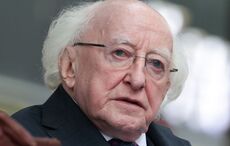Sinn Fein’s spokesman on Brexit has warned that, despite Irish and British reassurances, there is no guarantee that physical borders will not be restored in the North. His fears were echoed by Congressman Richard Neal, head of the Friends of Ireland caucus in the House of Representatives.
Both governments have rushed to state that there will be no such borders, but John O’Dowd, Former Minister for Education in the Northern Ireland Executive, said the two governments lack them authority to secure that.
O’Dowd stated there was “serious concern” among Irish Americans that the North would be forced out of the European Union despite voting to remain.
“The fact is that the European Commission will make the key decisions on this said O’Dowd. The British and Irish lack the legal right to decide it.”
In New York, Philadelphia and Washington on a recent visit the former Stormont minister stated that a lawsuit to clarify the legal position is being planned.
He stated that a cross-community coalition of politicians and human rights activists has written to British Prime Minister Theresa May insisting that before she triggers the mechanism to leave the European Union she must address legal obligations relating to Northern Ireland and to the peace process.
Failure to do so will see a High Court challenge launched by a group including leader of the Alliance Party and former Northern Ireland Minister for Justice David Ford, O'Dowd, leader of the nationalist SDLP Colum Eastwood, and leader of the Green Party in Northern Ireland Steven Agnew.
The other applicants are Dessie Donnelly, Director of Development with the Participation and the Practice of Rights group, Dawn Purvis, former Assembly member and onetime leader of the loyalist Progressive Unionist Party, plus disability rights activist Monica Wilson OBE. They are joined by prominent human rights group, the Committee on the Administration of Justice.
Meanwhile, Congressman Neal stated that after meeting O’Dowd he was deeply worried about how Brexit would impact Ireland.
"We have a very good meeting with the new Secretary of State for Northern Ireland James Brokenshire. We pressed very hard on the issue that there can be no return to a hard border.
Northern Ireland Secretary James Brokenshire.
"A key element of the Good Friday Accord is Strand Two, the ability to move people goods and services from Belfast to Dublin without return to Customs inspections or any sort of military checkpoint.
"Twenty-five years ago there were 30,000 British soldiers in the north of Ireland in an area the size of Connecticut. They are gone, the watchtowers are gone, and the policing have been reformed. Any hint of a return to the divisions between the two traditions would be a gigantic step backwards.
"I cited the example that 28 years ago, on a Congressional Delegation visit, in Buncrana in County Donegal on our way to Derry I was on a bus with the Speaker of the House Tom Foley and the British soldiers stopped us. They mounted the bus then they searched it. We can’t return to that.
"Brokenshire said that Prime minister Theresa May has assured him there will not be a hard border.
"He mentioned that he was having dinner that evening with the Irish Taoiseach (Prime minister) Enda Kenny and we reminded him that those of us who have been there for 30 years on these issues wouldn’t want to see something that would offend the very successful agreement we’ve had with the Good Friday Accord.
"I’m ever so hopeful that they will try to figure out perhaps a confederation with the European Union for the north of Ireland. Understanding that, although England and Wales voted to leave, Scotland and Northern Ireland voted to stay. Those sentiments, by substantial margins, should be acknowledged; perhaps they ought to figure out how to keep the north and Scotland in the EU – or a variant thereof – which would be important. I think they’ve understood the tenor of our suggestion.
"This is a chance incidentally to reach out to moderate unionists that would like to remain within some structure that acknowledges the EU. After all the Ulster Unionist Party endorsed the Remain campaign. First Minister Arlene Foster was fairly muted in her commentary but a couple of days after the vote she went out of her way to suggest they wanted to have some sort of working relationship with the EU.
Read more: Sinn Féin was never offered deal after four hunger strikers died, says MI5 official




Comments